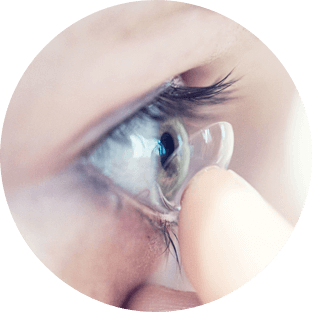Common FAQs About Cataracts

Knowledge is power. Perhaps you are starting to notice early symptoms of cataracts, already have been diagnosed, or love someone who has them. In any case, it’s wise to get at least a basic understanding of an extremely common condition in order to be able to advocate on your or your loved one’s behalf every step of the way.
What Is A Cataract?
A cataract is a build-up of protein that forms in a formerly clear natural lens, resulting in cloudy or blurred vision. The lens is the clear part of the eye which is responsible for focusing light and images back to the retina, which is then translated into nerve signals that tell our brain what we are looking at. When a cataract is involved, the image received by the retina will be blurry, which will make everything that you see blurry as well.
A person can develop a cataract in either one of their eyes or both. This condition is often referred to as “age-related” cataracts, as more than half of Americans 80 and over have cataracts or already have had the surgery to remove cataracts. This is a slight misnomer in that people as young as 40 can start to develop a cataract, but may not notice significant symptoms of vision loss until they are much older.
Causes Of Cataracts
The lenses of our eyes are made up primarily of water and protein arranged to keep the lens clear, allowing light to pass through it to the retina. As we age, proteins can begin to bunch together, clouding a small area of the lens. Smoking and diabetes also have been tied to an increased risk of developing cataracts.
Cataracts Symptoms And Your Vision
Common symptoms of cataracts can include:
- Double vision in the affected eye
- Reduced or diminished night vision
- Faded colors
- Vision that is either cloudy or blurry
- Seeing glare and halos around bright lights, or lights seeming too bright
Another sign of cataracts is a frequently changing prescription for your eyeglasses or contacts. Of course, these symptoms also could point to other eye conditions, so talk to your eye doctor at Mid Ohio Eye if you are experiencing any of the above.
Risk Factors Of Cataracts
- Age
- Diabetes
- Alcohol use
- Smoking
- High levels of exposure to the sun’s UV rays (always wear UVB sunglasses!)
Treatment Options
Early symptoms can be corrected with prescription eyeglasses or contacts. Anti-glare sunglasses also can help. Surgery should be discussed with your eye doctor when the cataract has grown large enough to disrupt your vision and your daily routine, including driving and reading.
How Effective Is Surgery?
Cataract surgery is one of the safest and effective surgeries and is one of the most commonly performed procedures in the country.
Cataract Surgery Risks
As with any surgery, there are risks associated with cataract removal. Infection and bleeding are possible risks, so you should talk to your doctor about any medications you may be on that can increase that risk. Infection risk can be minimized by keeping your hands clean and following your surgeon’s post-op directives.
Reducing Your Cataract Risk
- Wear UVB sunglasses
- Quit smoking
- Eat foods high in antioxidants
- See your eye doctor for regular checkups
Just because you have cataracts doesn’t mean your vision is lost! Schedule an appointment with one of the talented doctors at Mid Ohio Eye!














